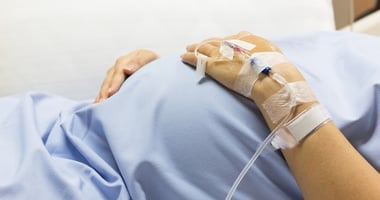Autism spectrum disorder and depression were more common in Swedish children and adults born to...
Exposure to Mother’s Heightened Immune Response in Womb May Increase Schizophrenia Risk
 |
“We found that higher concentrations of proinflammatory cytokines [TNFα, IL-1β, and IL-6] in specifically the first half of pregnancy were associated with a risk for psychosis among offspring, implicating an earlier timepoint in gestation than previously understood,” wrote Dana Allswede, M.S., and Tyrone Cannon, Ph.D., of Yale University and colleagues. “These three cytokines are potent proinflammatory proteins that have a critical role in the initial response to infection and in initiating and sustaining inflammatory responses.”
The findings were based on data collected for the National Collaborative Perinatal Project (NCPP)—a large-scale prospective longitudinal study. As part of this study, pregnant women from across the United States provided blood samples at prenatal visits and birth from 1958 to 1965.
Allswede, Cannon, and colleagues focused on the women and offspring in the Philadelphia cohort of NCPP, which included 9,236 surviving offspring of 6,753 pregnant women. The researchers examined medical records to determine whether the offspring developed psychotic disorders by adulthood. They also analyzed the concentrations of the following cytokines in the maternal blood samples: TNFα, IL-1β, IL-5, IL-6, IL-8, IL-10, and IL-17a.
The final sample included 90 offspring who later developed psychosis, 79 siblings who did not have psychotic disorder, and 273 matched controls who did not have psychosis. The researchers found that concentrations of proinflammatory cytokines TNFα, IL-1β, and IL-6 were significantly higher in the maternal blood samples of the offspring who later developed psychosis compared with maternal blood samples of the matched controls. “These differences were greatest in the first half of pregnancy …, with no difference observed during the second half of pregnancy,” the authors noted. Siblings and the matched controls did not significantly differ for any of the cytokines.
“Understanding which environmental factors interact with maternal inflammation to increase the risk for psychotic conditions in the offspring, and the pathways through which they act, might provide a framework for early intervention (whether at the maternal, paternal, or childhood level) and build momentum for a much-needed preventive approach to neuropsychiatric disorders,” wrote Bruno Agustini, M.D., Ph.D., and Michael Berk, Ph.D., M.B.B.Ch., of Deakin University in an accompanying editorial.
For related information, see the American Journal of Psychiatry article “Maternal Bacterial Infection During Pregnancy and Offspring Risk of Psychotic Disorders: Variation by Severity of Infection and Offspring Sex.”
(Image: pio3/Shutterstock)
Follow Psychiatric News on Twitter!
And check out the new Psychiatric News Brief on Alexa-enabled devices.
And check out the new Psychiatric News Brief on Alexa-enabled devices.





